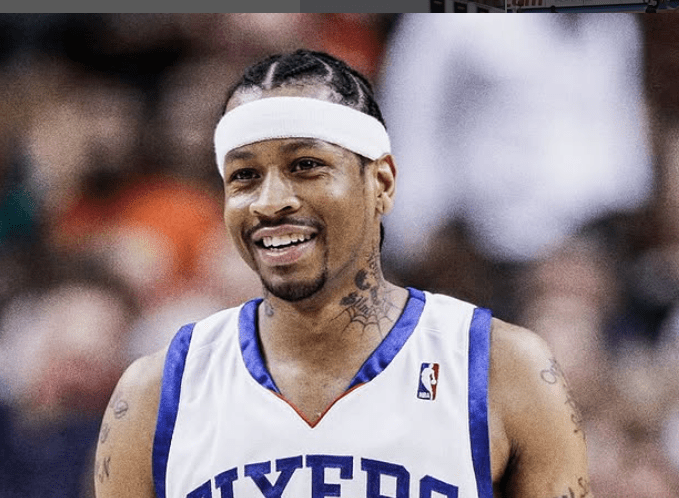With its heroic ascent, disastrous decline, and redeeming act at the end, Allen Iverson’s financial saga still bears a striking resemblance to a Greek tragedy. Anyone who understands the transient nature of celebrity fortune, as well as sports fans, is enthralled by his career trajectory, which is characterized by explosive talent and profoundly human blunders. Iverson was earning over $20 million annually at his height. Remarkably low for a former MVP whose name used to reverberate through arenas like a drumbeat of cultural defiance, his net worth now stands at a meager $1 million.

Few athletes have had as much of an impact on American sports over the last thirty years as Allen Iverson. He came from Hampton, Virginia, and when the Philadelphia 76ers selected him first overall in the 1996 NBA Draft, his unadulterated talent at Georgetown launched him into the spotlight. Iverson entered professional arenas and dominated with fearless intensity despite being only six feet tall, which was deemed undersized even in high school basketball. He is one of the most effective scorers in history, averaging 26.7 points per game.
| Attribute | Details |
|---|---|
| Full Name | Allen Ezail Iverson |
| Date of Birth | June 7, 1975 |
| Age | 50 |
| Birthplace | Hampton, Virginia, U.S. |
| Height | 6 ft 0 in (1.83 m) |
| Weight | 165 lb (75 kg) |
| Playing Position | Point Guard / Shooting Guard |
| NBA Career Start | 1996 |
| Official Retirement | 2013 |
| Teams Represented | Philadelphia 76ers, Denver Nuggets, Detroit Pistons, Memphis Grizzlies |
| Career Highlights | 11× NBA All-Star, MVP 2001, 4× Scoring Champ, Hall of Fame 2016 |
| NBA Career Earnings | Estimated $155 million |
| Total Estimated Earnings | Over $200 million (including endorsements) |
| Current Net Worth | $1 million (as of 2024) |
| Reebok Trust Fund | $32 million payout scheduled for 2030 (Iverson’s 55th birthday) |
| Cultural Significance | Influenced fashion, music, identity, and authenticity in professional basketball |
| Reference | https://www.nba.com/stats/player/947/profile |
Iverson inspired a generation and destroyed defenses with his lightning-fast footwork, unrivaled crossover dribbles, and unbreakable spirit. But his influence went far beyond hardwood floors. By adopting hip-hop style, sporting cornrows and diamond studs, and displaying his true self without apology, Iverson challenged a league and a public that wasn’t prepared to accept such prominence from a Black athlete. A cultural change was sparked by his presence. Players like Ja Morant and Damian Lillard, whose styles and attitudes mirror Iverson’s blueprint, are still a clear example of his influence today.
Iverson had a brilliant career, but his financial path took a very different turn. He reportedly made over $200 million from high-value endorsements, such as those with Reebok, Coca-Cola, and T-Mobile, and lucrative NBA contracts. However, in 2012, he famously acknowledged that he couldn’t afford a cheeseburger during a heated divorce hearing. That remark came to represent his precipitous financial downfall. He filed for bankruptcy a few months later.
Tragically, the causes of his financial collapse are well known. Particularly expensive were extravagant spending, giving friends upscale presents, taking a big group of people on trips, and not having a sound financial plan. Iverson’s approach was impulsive in contrast to his peers, like Tim Duncan and Kobe Bryant, who used measured investment strategies. His generosity was freely shared by friends, family, and even complete strangers. Surprisingly, though, he never lost the public’s love.
During his time of excess, one particularly inventive safeguard did survive. Years ago, he signed a contract with Reebok that included a $32 million trust that would only be accessible when Iverson turned 55. The 2030 payout is still protected from previous creditors and court cases. Many fans think that this delayed fortune will finally give him peace of mind. He still receives an annual stipend of $800,000 from Reebok in the interim, which is small in comparison to previous salaries but essential for his financial stability.
Iverson’s vulnerability has emerged in recent interviews with a refreshing candor. He frequently considers lost chances and bad choices with responsibility rather than resentment. Standing next to legends like Shaquille O’Neal and Yao Ming at his 2016 Hall of Fame induction, he expressed his sincere gratitude to mentors John Thompson and Larry Brown, who both offered support during difficult times in his career. Fans were reminded by his impassioned and appreciative speech that beneath the legend lay a man who had been molded by adversity, achievement, and fortitude.
Iverson has made a more deliberate comeback to public life in the last ten years. In 2017, he hinted at a quiet return by becoming a coach and occasional player in Ice Cube’s BIG3 League. Although his physical limitations prevented him from performing in the same way as before, his impact electrified audiences. Instead of anticipating 40-point performances, fans came to honor his legacy. Iverson was remarkably successful at attracting attention and admiration, even in a diminished athletic state.
Iverson’s story is frequently cited as a warning in the context of contemporary athlete wealth management. However, it’s also being reframed more and more as a human one, complete with emotional complexity and second chances. Even though his financial errors are noteworthy, they are a part of a larger discussion about the strains placed on young athletes who are given vast sums of money without any planning. Today’s rookies receive mentoring and seminars on media scrutiny, brand building, and budgeting. Because of this institutional support—which was influenced by Iverson’s time—the number of newly drafted players who have declared bankruptcy has drastically decreased.
Iverson has also gradually restored his reputation in business circles through strategic alliances and changing public relations. Reebok’s choice to uphold his lifetime contract in spite of his prior scandals demonstrates how legacy and loyalty can still be mutually beneficial. Additionally, his story acts as a link between generations. Millennials remember him as the face of a changing NBA—unfiltered, nuanced, and incredibly relatable—while Gen Z may recognize him from highlight reels and streetwear partnerships.
Iverson has kept a low profile ever since he formally retired in 2013. However, every time he appears in public, whether it be on a podcast, a sports panel, or courtside at a Sixers game, we are reminded of why he is still so beloved. The public values him for his flaws, honesty, and the emotional realism he consistently brought to the game rather than just his skill. Over time, he has emerged as a representation of genuineness in a field that is frequently honed to perfection.
